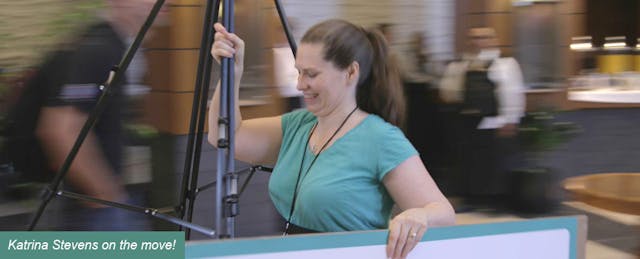The “six degrees of separation” rule doesn’t apply to the rare individual whose work directly impacts the lives of many. In education, that may be Katrina Stevens.
Few are as connected as Stevens. After nearly two decades as an English teacher and administrator, she embarked on the entrepreneur route, cofounding a startup and building the edtech community through organizing events like Startup Weekend Education. And that’s before she joined EdSurge as our Summits Director.
Now, Stevens is adding another challenge to her plate, serving as Executive Director of EdTech Maryland, a nonprofit dedicated to bringing together school districts, universities, entrepreneurs and policymakers to create a thriving edtech ecosystem.
“We are so proud of Katrina and the great work that she’s doing to foster innovation in education,” says Betsy Corcoran, CEO of EdSurge. “She’s been a great member of the EdSurge team--and we look forward to continuing to work with her as an EdSurge contributor and collaborator, even as she gets EdTech Maryland up and running.”
Strong Education Roots
EdTech Maryland was born from the Greater Baltimore EdTech Advisory Task Force, an informal group of local educators and entrepreneurs that began meeting a year and a half ago to explore the community’s appetite for a larger edtech ecosystem. They found their answer in the EdSurge Baltimore Summit, which Stevens masterfully organized in a mere 43 days. More than 30 companies and 700 teachers attended, along with two state senators and Jim Shelton, the outgoing U.S. Deputy Secretary of Education.
“It was a moment where districts came together and worked together, and where everybody across the board said it was the right time,” recalls Stevens.
Maryland may be small, but don’t overlook it, advises Stevens. In many ways, it’s a microcosm of the challenges and opportunities facing educators and entrepreneurs around the country. Different types of schools--public, private, charter, urban suburban and rural--are all within a few hours’ drive. The state is also home to nearly 100 education companies--some of which, like Laureate Education, have been around for over a decade.
EdTech Maryland’s mission will be to galvanize this community by leveraging the strong, established education base (the state’s public schools consistently rank top in the country) to attract entrepreneurial talent, and forge closer ties between schools and companies to ensure that smart and sensible tools are addressing real needs in the classroom.
One of Steven’s biggest tasks will be overseeing a “Research Consortium” that connects entrepreneurs and educators to run short-cycle pilots to measure the efficacy of technology products. “We serve as a mutual broker that helps districts understand what they should expect and look for in a pilot, and help companies how to understand the value even if the pilots don’t turn out well.”
Minimizing the risk and consequences for schools will be key to scaling these pilots. Having seen some schools fatigued and feeling burned from unsuccessful experiments with new tools, she “wants to do it at a thoughtful pace and set the right expectations.” So far, three districts have expressed interest in participating and another five are in discussion. The plan is to “pilot the pilot” in spring 2015 in anticipation of a broader rollout in the autumn.
EdTech Maryland will also regularly host Meetups, happy hours, breakfast roundtables, Startup Weekends and, yes, EdSurge Summits.
What EdTech Maryland will not do is create another edtech incubator. “There are over 20 highly functional incubators within the state,” explains Stevens. Instead, Frank Bonsal, an EdTech Maryland board member, investor and Director of Entrepreneurship at Towson University, will create an edtech mentorship network open to any education companies and entrepreneurs in an Maryland incubator.
And while it is not looking to invest in startups, EdTech Maryland will support policies that make the state more attractive to prospective entrepreneurs. Maryland currently offers tax incentives to encourage fibertech and biotech companies--a strategy that the group may adopt for edtech startups. Already, Citelighter and Three Ring have left the bright lights of the Big Apple for Baltimore. And another three may be on their way.
The Journey Continues
For most people, running EdTech Maryland would be a full-time job. Stevens, however, is still reserving time to continue supporting EdSurge. She will continue to write and help foster a network of relationships--serving as an ambassador as this organization continues to spur dialogue between those who build and those who use education technology, with the goal of supporting learners.
“I really enjoy being able to get something off the ground and get it up and running,” she proclaims. And what a job she’s done, spearheading EdSurge Summits in Baltimore, Los Angeles, Mountain View, Nashville, Seattle and St. Louis and laying the groundwork for many more to come.
“My passion has always been about bringing stakeholders together. The EdSurge Summits were about bringing together entrepreneurs and educators in different communities across the U.S. For me, this is just an extension of that work, but in a focused region, to drive the conversation we need to make sure we’re moving in the same direction.”
Stevens almost moved to Silicon Valley last year but decided to stay in Baltimore. “There is something really special about this city that makes it different from other edtech hubs,” she confides. “It’s a little more gritty, and the investors here genuinely believe in the double-bottom line. They fund companies that have a clear revenue model and clearly show that they’re improving student learning.”


